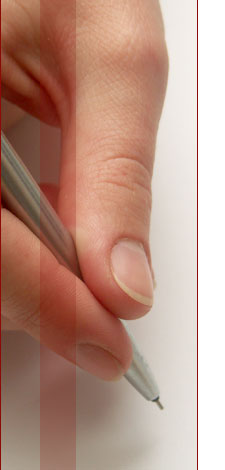Special rate for students: Proofreading starting at 1.99 Euro per page (incl. Tax) • New and only with me: free plagiarism check • Request a free edit now! |
|
|
You should know this:
1. Words that are frequently misspelled in German
| Correct |
| aufrecht erhalten |
aufrechterhalten |
| Aquisition |
Akquisition |
| Cash Flow |
Cashflow |
| darüberhinaus |
darüber hinaus |
| des weiteren |
des Weiteren |
| folgendes/im folgenden |
Folgendes/im Folgenden |
| gleiches |
Gleiches |
| Know-How |
Know-how |
| Kommitee |
Komitee |
| der Marketing-Mix |
das Marketingmix |
| näheres |
Näheres |
| Null |
null (aber: die Null) |
Preis-
/Leistungsverhältnis |
Preis-Leistungs-Verhältnis |
| Rechtssprechung |
Rechtsprechung |
| time-lag |
Timelag |
| von einander |
voneinander |
| wiederspiegeln |
widerspiegeln |
| der zweite Weltkrieg |
der Zweite Weltkrieg |
| zum Einen, zum Anderen |
zum einen, zum anderen |
| zum ersten, zum zweiten |
zum Ersten, zum Zweiten |
2. Comma placement
a) Wrong, just as in the English sentences:
„Aufgrund der unterschiedlichen Komplexitätsansprüche, kann das Qualifikationsniveau der Stelleninhaber differieren.“
„Im Gegensatz zum betriebswirtschaftlich geprägten Begriff der Kooperation, handelt es sich beim Kartell um einen Begriff aus dem Rechtswesen.“
„Laut einer Studie des Deutschen Instituts der Deutschen Wirtschaft, halten ca. 50 Prozent der Arbeitnehmer ein gutes Arbeitsklima für wichtiger als das gezahlte Gehalt.“
In all three sentences the comma has to be deleted!
b) No comma before „etc“ and „as well“:
In front of „etc.“ a comma is not necessary, as "et cetera" (Latin: and others) contains the word "and" already, in front of which you would normally not place a comma when listing items.
In front of "as well" we do not use a comma either, as this word is used instead of "and", in front of which you would normally not place a comma when listing items. 
3. Grammar
„Zuvor sind jedoch eine Reihe von Tests und Verfahren durchzuführen.“
„Die Hälfte der Autoren vertreten hingegen die Meinung, dass …“
„In der Literatur existieren eine Vielzahl von Ansätzen zur Beschreibung und Erfassung der Markenidentität.“
Seeing that in all three sentences the subject is shown as singular (die Reihe, die Hälfte, die Vielzahl), the verb has to be written in the third person singular: „ist“ instead of „sind“, „vertritt“ instead of „vertreten“ and „existiert“ instead of „existieren“.
4. Miscellaneous
- In a continuous text numbers from one to twelve are to be written in letters, whereas numbers from 13 onward are to be written in digits. Numbers below 13 are only written in digits if they are written in conjunction with a unit and if it seems more fitting in terms of getting a better overview of the text.
- In scientific papers the author's name does not include the title (Dr., Prof, etc.).
- At the end of structured numbers (1. 1.1 1.1.1) no period is needed.
- Footnotes always begin with upper case letters and never end with a period.
- Introductory German quotes are at the bottom, closing quotes at the top.
- Utilize typographic dashes rather than hyphens.
- You always include a space In front of „%“ and after „§“.
|
|
|
|



